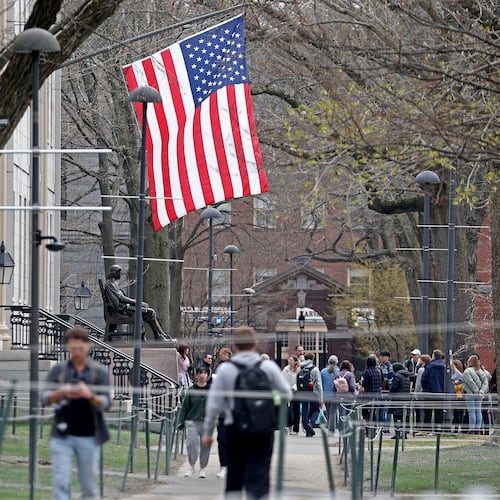A vigorous debate over the role of government is always at the heart of our democracy. Since the shootings in Arizona, however, many have said that our partisan ferocity is unhealthy.
So it seems like a good time to reflect on Ronald Reagan and Tip O’Neill. It would serve us well to understand how these very different politicians managed to temper their philosophical divide with a public, and sometimes personal, cordiality.
About this time of year three decades ago, Reagan went to the Capitol to deliver the State of the Union address. His designated “holding room” was the speaker’s ceremonial office just off the House floor. I was a senior aide to the speaker, and I thought a little kidding was in order.
“Mr. President, welcome to the room where we plot against you,” I said.
“Oh, no, not after 6,” he replied. “The speaker says that here in Washington we’re all friends after 6.”
Reagan was warm — and he meant his words. For years, he and O’Neill engaged in tough partisan competition. They gave no quarter and expected none. The president believed that government wasn’t the solution; it was the problem. The House speaker believed that people, especially the old, the sick and the young, needed help along the way.
There was something the American people liked about this test of wills. Voters saw these political heavyweights jousting over ideas and dealing with each other as worthy opponents. Citizens clearly felt satisfied that these politicians were fighting the good fight on their behalf.
Reagan had a basic philosophy: cut taxes, cut the size of government and beat the Soviets. Tip believed that Social Security had alleviated the fear millions once had of old age, and that the GI Bill and other government programs built the American middle class. Yet, occasionally, the two found common ground.
“Tip had the last word and it was good one,” Reagan jotted in his diary after one meeting. Another entry: “I’m having more luck with Demos than Repubs. Asked O’Neill if I could address a joint session next week. He agreed.”
To soften the edges, they would share lunches from time to time, and always on St. Patrick’s Day.
“It’s Tip’s birthday and we had a good time telling stories — Irish stories,” Reagan wrote. That lunch, his aide Ken Duberstein later told me, lasted till 3 p.m.
Their disagreements over the country’s direction were impassioned and sincere.
“I called Tip O’Neill. I’m not sure he’s ready to give in,” the Gipper once wrote. “Tip is truly a New Deal liberal. He honestly believes that we’re promoting welfare for the rich.”
The speaker got frustrated more than once. He would come back from White House meetings complaining that the president read everything “off three-by-five index cards.”
But consider the bond some Reagan diary entries suggest: “Tip and I got into Donnybrook. I really had my dander up. The worst of it is Tip O’Neill doesn’t have the facts of what was in the budget. Besides he doesn’t listen.”
“Tip is a real pol,” Reagan wrote after one St. Patrick’s Day lunch. “He can really like you personally and be a friend while politically trying to beat your head in.”
Here’s Tip on Reagan: “Away from politics, he’s a charmer.”
There was something there I miss today. They argued, but they were always able to talk. And there were important times for the country when they put their heads together. When Reagan took office wanting to push cuts in taxes and domestic spending, Tip refused to play games. There was no filibustering, no efforts to jam up the system. Reagan deserved his time at bat.
In Reagan’s second year, a deepening recession had put his policies in question, and the Democratic speaker had the upper hand. “Tip O’Neill made a speech to Republicans telling them why they should support me. It seemed strange — both of us on the same side,” Reagan wrote.
In 1983, after a big Democratic victory in the midterms, both backed the bipartisan solution to keeping Social Security sustainable. Later, in a joint effort, they passed a historic tax reform.
Reagan would later say that he recognized Mikhail Gorbachev as a different kind of Soviet leader — and that it reminded him of his relationship with Tip.
Tip’s daughter Susan recently told me about her father’s feelings toward Reagan: “He liked him.”
When Reagan spoke at Tip’s goodbye party in 1986, he said: “Mr. Speaker, I’m grateful you have permitted me in the past and I hope in the future that singular honor — the honor of calling you my friend.”
I didn’t get the full picture on this fascinating relationship until much later. After the assassination attempt, Reagan was in far worse shape than was publicly known when Tip arrived at the hospital. Max Friedersdorf, the president’s congressional liaison, was alone across the room.
In a letter to me, Max described how the speaker went to Reagan’s bedside, took hold of both his hands and knelt. “Thanks for coming, Tip,” he heard the president whisper.
The two recited together the 23rd Psalm. Tip rose, kissed Reagan on the forehead and said he didn’t want to keep him from his rest.
Max shared this story long after both men were gone. It would have been good to hear earlier — because it shows how deeply these political giants recognized and honored their shared humanity, despite their stark differences of philosophy.
It is a joy to savor it now.
Chris Matthews hosts “Hardball” on MSNBC and “The Chris Matthews Show.” He was a senior aide to House Speaker Thomas P. “Tip” O’Neill Jr. from 1981 through 1987.
About the Author
Keep Reading
The Latest
Featured


